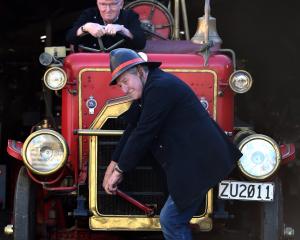The philosophy made Henry Monson (1793-1866) famous, not only because he was Dunedin Prison's first jailer, but also because he actually practised what he preached.
He led prayer meetings, taught prisoners literacy and abstained from the use of flogging.
And more than 150 years later, his great great great great-granddaughter Louise Monson (17) has won the year 13 category of the 2008 New Zealand History Teachers Association Young Historians Competition with research about Monson and the social conditions of the 1850s.
The Otago Girls High School pupil said her research was initially inspired by her desire to find out more about her ancestor and why he came to New Zealand.
In the process, she learned he was a compassionate and inspirational man who spent much of his own money to make living conditions better for prisoners.
"The prisons at the time were old barracks - they had no beds, no furniture, the floors were made of dirt, there was no cutlery and very little to eat.
"He was a very religious man and he believed everyone should be treated fairly."
"I was happy with what I had already achieved.
"I learned lots about my family and the social and economic conditions of the time.
"So, winning was definitely a bonus."
Despite her admiration for her great great great great-grandfather, she had no ambition to follow in his footsteps.
Instead, she planned to study history and music at the University of Otago next year and become a teacher.
"I don't want to be the ambulance at the bottom of the cliff.
"I would rather educate people so they don't turn to a life of crime."
University of Otago historian and competition judge Prof Tom Brooking was impressed with the level of research which went into Louise's project.
"This highly original project extended the biographical study to assess the nature of crime and the role of prisons in New Zealand of the 1850s and 1860s, revealing a side of our social history too often neglected by historians."
Otago secondary school pupils dominated the results of the competition.
In the year 13 category, Taieri College pupil Anna Stevens and Bayfield High School pupil Henry Benson-Pope were equal second.
Otago Girls High School pupil Jessica Moore was second in the year 12 category and Taieri College pupil Alicia Rosevear third in the year 11 category.











